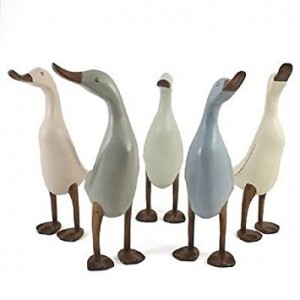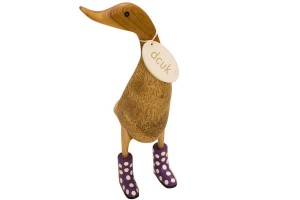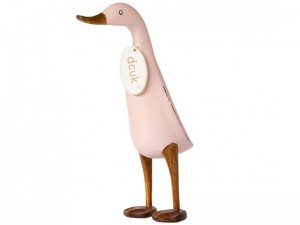Sometimes, when you have been writing stuff for a general and quite large audience for a long time, you need to give yourself a holiday. For me, that holiday is blogs. Unpaid, unstructured, unedited, loosey-fucking-goosey blogs. Blogs are usually seen as the stepping-stone format: they are the thing you usually do before you become a writer who makes money. While that is sometimes true, it is also a little unkind to blogging as an art in itself. Is drawing with pen and ink a lesser art than painting with oils, just because pens are easier and cheaper to come by than oil? I don’t think so. Blogs let you be super specific without having to worry that you’re short-changing an editor out of their audience, and with that in mind, I want to talk to you about these fucking ducks I keep seeing everywhere.
You know what I’m talking about, right? They are ducks, they are usually wooden, and always in Wellington boots. They fall over if there is the slightest atmosphere change in the room they’re in. If you open a window in on the first floor and your duck is on the third floor, the duck will fall over. If you have a terse conversation with someone about where to have lunch, and the duck is in earshot, the duck will fall over.

They are not for hanging jewellery off of. They are not door stops. They are usually purchased from shopping centre furniture shops, the kinds of places where everything has a craft-fair/folk art vibe, a huge mark-up, and crucially, can be taken home by car on day of purchase. The biggest thing anyone buys from these shops is a beanbag, or a single dining chair.
The ducks are purely ornamental, which, to a millennial, is a term interchangeable with “profoundly useless”. As a generation, we like all of our household decorations to have a double use: our books brighten up a room, but they also contain knowledge. Our plants keep the air clean, and are good for mindfulness, I guess. The ducks? The ducks do nothing.
I don’t hate the duck. I have a duck. It’s in my hallway. And I am always, always shocked when a woman comes over, and she picks up the duck.
“I have one of these,” she says. “Only it has green boots.”
The woman almost always has a mother that she lives far away from. She received the booted duck in the post one day, wrapped in bubble paper, and the bubbles are always sellotaped extra-fastidiously around the beak, because however useless the duck is, it would be a step below useless – trash – if the beak were to fall off during the postage process.
Courtesy of my mum. pic.twitter.com/jEJTqLXr8z
— Sian Meades ✨ (@SianySianySiany) December 4, 2017
Yep it's a mum thing (Cc @SianySianySiany) pic.twitter.com/NBeXSbhMnA
— Alexandra Pullin (@alexandrapullin) December 4, 2017
Why are our mothers sending us these, their daughters who live abroad, these ducks? My friend Ella and I lie in my bed and discuss the mystery. I get the duck from the hallway and we turn it over and over in our hands, wondering what the essence of the duck’s value is. There’s something kind of gormless about the duck’s expression. If I had to describe its face, I would call it “good-naturedly attentive, in spite of its utter lack of worldliness or understanding”.
“Our mothers are sending us these ducks,” Ella says. “Because they think we are these ducks.”

She is right, I think. When our mothers imagine their daughters who live abroad, I think they imagine us like this: plodding determinedly about, our skinny legs forever threatening to escape our oversized, ridiculous boots. Our faces are always tilted to the sky, our necks extended, never sure what’s going to happen next but sort of game for whatever it is.
The wood on the duck’s neck is smooth, and sometimes I run my finger on it when I’m taking a phone call in the hallway.
When I’m home, and sitting at the kitchen table, my mum will always place both hands on the base of my neck, her thumbs meeting at the top of my spinal chord.
“You grew into your neck, in the end, didn’t you?” she says, and she’s right, I did, because I had a neck as long as an adult woman’s when I was about eight, and even now my childhood photos take me by surprise. They have a funhouse mirror quality to them, because my head is hovering slightly too far from my shoulders. I don’t think anyone remembers this small detail about me, apart from my mother. I don’t think anyone thinks about my neck as much as she does.
I wish I liked anything about another living person the way my mum likes my neck about me.
Maybe that’s what she saw of me, on the day she bought the duck. Maybe all of our mothers see something different in the duck, something inescapable and unavoidable and terribly naive, and maybe that’s what drives them to spend somewhere between £22 and £30 on it, plus postage. Maybe the gnawing insecurity of having to forever be making educated guesses on what your daughter is doing, over there, in that city, is not something that can ever be truly soothed by phone calls and frequent weekend visits. Maybe the missing of her becomes so great, and the worry so middle-of-the-night terrible, that all you can do is hope, hope with your wallet, that she is safe, and happy, and gormless, and has a hell of a lot of neck.

